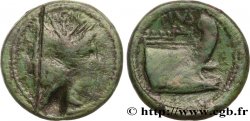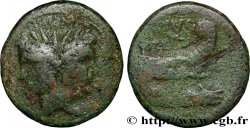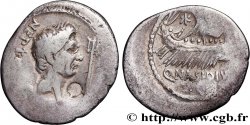v21_2257 - POMPEY THE GREAT As, (GB, Æ 30)
MONNAIES 21 (2004)
Starting price : 550.00 €
Estimate : 950.00 €
unsold lot
Starting price : 550.00 €
Estimate : 950.00 €
unsold lot
Type : As, (GB, Æ 30)
Date: c. 43-36 AC.
Mint name / Town : Sicile
Metal : bronze
Diameter : 29,5 mm
Orientation dies : 12 h.
Weight : 15,42 g.
Rarity : R2
Coments on the condition:
Très beau portrait de la tête janiforme avec les traits de Pompée le Grand. Jolie patine verte. Revers bien venu à la frappe. Petite faiblesse de frappe sur les légendes
Catalogue references :
Predigree :
Cet exemplaire provient de la vente Vecchi 3, 13 septembre 1996, n° 608
Obverse
Obverse legend : [MAGN].
Obverse description : Tête janiforme laurée de Pompée.
Obverse translation : “Magnus”, (le grand).
Reverse
Reverse legend : [PIVS]/ IMP.
Reverse description : Proue de galère à droite.
Reverse translation : “Pius/ Imperator”, (Pieux, Imperator).
Commentary
Poids léger. Pour ce type, les auteurs du Roman Provincial Coinage ont fait un relevé de 185 exemplaires dont 164 pièces provenant de l’étude de M. Bahrfeldt (NZ. 1909, p. 106-165).








 Report a mistake
Report a mistake Print the page
Print the page Share my selection
Share my selection Ask a question
Ask a question Consign / sell
Consign / sell
 Full data
Full data

